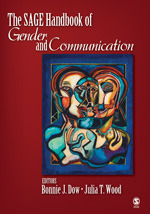The SAGE Handbook of Gender and Communication
no information available
The Handbook of Gender and Communication begins from the premise that gender is, at once, an aspect of both individual identity and of social structure that dramatically and relentlessly shapes individual and collective life Communication is central tthis process, and the Handbook brings together leading scholars in the area whreview and evaluate the state of research on gender and communication through discussion of existing theories and research as well as through identification of important directions for future scholarship The Handbook includes a general introduction and five sections that focus on primary contexts in which gender and communication are shaped, reflected and expressed: interpersonal; organizational; rhetoric; media; and intercultural/global ... Read more Read less











